IOS organises lecture on “Unity of Ummah: Limits and Etiquette of Disagreement”
October 31, 2015 at 162, Jogabai, Institute Building, Jamia Nagar, New Delhi
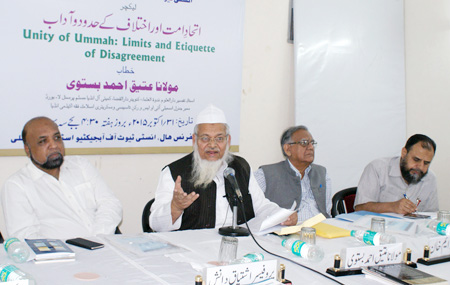
L-R: Prof. Ishtiyaque Danish, Associate Professor of Islamic Studies, Jamia Hamdard; Maulana Ateeq Ahmad Bastavi, ustad of Tafseer, Darul Uloom Nadwatul Ulema, Lucknow; Prof. ZM Khan, Secretary General IOS; Prof. M. Afzal Wani, Professor of law at the Guru Gobind Singh IP University
The Institute of Objective Studies hosted a lecture on the “Unity of Ummah: Limits and Etiquette of Disagreement” on October 31, 2015 at the conference hall of the Institute. Maulana Ateeq Ahmad Bastavi, ustad of Tafseer, Darul Uloom Nadwatul Ulema, Lucknow, convenor, Darul Qaza Committee of the All India Muslim Personal Law Board, founder-member and secretary, Islamic Fiqh Academy and member, General Assembly of the IOS, who delivered the lecture, emphasised that prophets from Adam (PBUH) to the Prophet Hazrat Mohammad Mustafa (SAW) spread the message of oneness of God and unceasingly strove for impressing upon mankind to keep itself away from paganism and multiplicity of godhood. As far as the existence of one God is concerned, there was no difference among the prophets. They invited their ummah to follow God, who is the Master of all the creation transcending all the worlds. He said that the holy Quran has preserved the record of the call of a number of prophets to their followers in several surahs. Referring to the teachings of Prophet Adam and Prophet Noah, he said that their call was centered on the existence of God. This could be treated as the beginning of the Unity of Ummah, he noted. He remarked that Surah Hijrah contained teachings that pointed to unity among Muslims. These teachings fostered love and affection among the faithful and forbade such actions that might create cleavage in the ranks of Muslims.
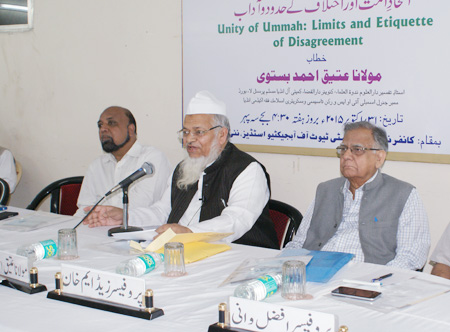
Quoting extensively from the Hadith, Maulana Bastavi explained that Muslims were taught to adore one God only, i.e., Allah and securely cling to His rope and not split into sects. The edifice of unity among the Ummah rested on the Kalimah. Muslims had also been ordained to give a helping hand to one another and shun actions that could nurture misunderstandings leading to differences. These differences might hurt the feeling of other co-religionists, he said. Commenting on the present state of affairs in the Muslim world, he regretted that they were badly divided in sects and unity was a far cry. Reminding Muslims of the impending danger from reactionary forces represented by the RSS and its allied organistions, he said that they were impatiently waiting for the Ummah’s disintegration as a well-knit community. Cautioning against the agenda of Hindu revivalism and militancy led by the RSS, he said that the Hindu ultra right organisation was vigorously pursuing it. It had always been planning to divide Muslims in the name of caste, sect and region. In order to achieve its goal these organisations strike at the root of the unity of the Ummah.
He suggested that ulema, community leaders, scholars and Muslim intelligentsia should reach a consensus on the basis of the Kalimah by closing their ranks on trivial issues. Only then the position could be salvaged or else the community was feared to lose its identity. He also hinted at the danger to the rich legacy of faith which our progeny had to be handed down.
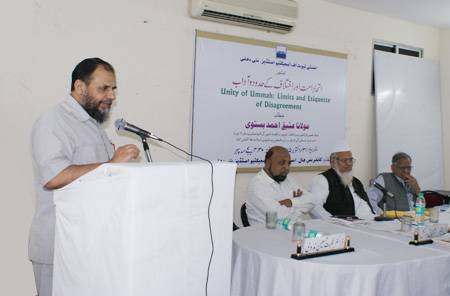
Professor of law at the Guru Gobind Singh IP University and Assistant Secretary General of the IOS, Prof. M. Afzal Wani, hailed the lecture as worth pondering over as every living being was the creature of God. Referring to the Quranic emphasis on love among human beings, he said that we must examine our success in that light. The entire Ummah was duty-bound to take a practical view of the problem, he noted.
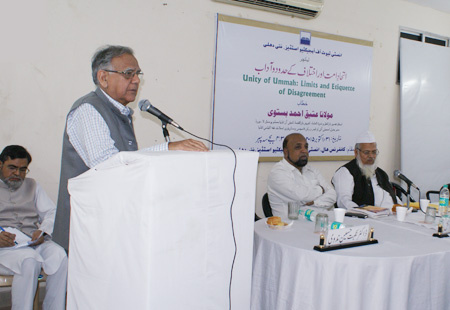
The Secretary General of the IOS, Prof. ZM Khan observed that the Institute had been regularly holding discussions on such issues. He said that the Chairman of the IOS, Dr. Mohammad Manzoor Alam had already engaged the leaders of the community in the discussion on unity among different sects of Islam. But what was imperative was the participation of all concerned people of the community in this task. He informed that the Institute had earlier organised an international seminar on the subject. For larger unity, family should be made the unit to start with. “How can we think of achieving a greater unity, if we cannot sit together?” he asked. The Quran always stood for institutional unity, be it mosque or waqf, he added.
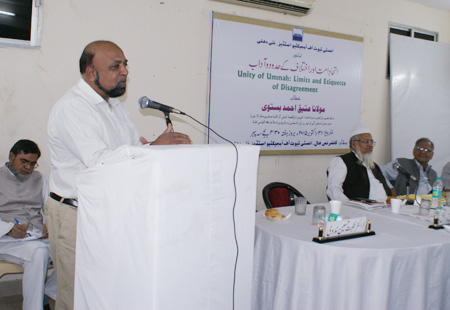
In his presidential observations, Associate Professor of Islamic Studies, Jamia Hamdard and Finance Secretary of the IOS, Prof. Ishtiyaque Danish, laid stress on limiting the areas of divergence by formulating a proper strategy. We should be wary of the areas that led to disagreement. He opined that in every school of thought, there were conscious leaders who could lend a helping hand in narrowing differences. Expressing concern over the Shia-Sunni rift, he said that some of the Shia leaders were willing to put aside controversial issues in the interest of a larger unity of the Ummah. He assured that the IOS would continue to focus on such issues in future as well for bringing down differences to the minimum.
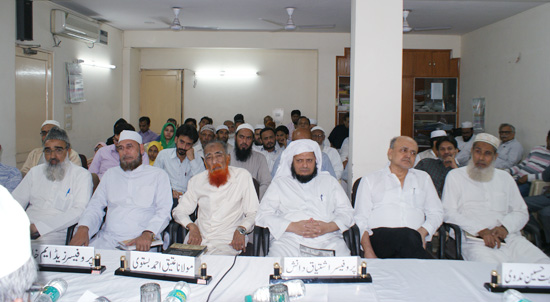
Earlier, the function began with the recitation of a verse from the Holy Quran by Hafiz Athar Husain. Dr. Nakhat Husain Nadwi, in-charge of the Arabic Section in the IOS, conducted the proceedings. Those who attended the lecture included Naushad Ahmad, Arshad Sirajuddin Makki, Abdul Qadir Khan, Syed Mohsin Ali Kirmani, Ahmed Nadir-al-Qasmi, Mr. Mohammad Zeyaul Haque, Rashiduddin, Ataur Rahman, Iqbal Husain, Moinuddin, Md. Kazim Sher, advocate, Haseeb Ahmad, Md. Umar Abideen Qasim Madani, Dr. Mohammad Ahsan, Dr. Mohammad Qasim Adil, Suhail Abideen, Bayaz Hashmi, Khateeb Tihami and Zulaikha Jabeen, besides several Islamic theologians, research scholars of Islamic Studies, social activists and prominent citizens of Delhi.
Go Back